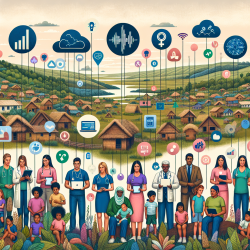Introduction
In the ever-evolving field of speech-language pathology, practitioners are continually seeking innovative ways to enhance therapeutic outcomes for children. Interestingly, insights can be drawn from seemingly unrelated fields, such as agriculture, to inform our practices. A recent study titled Attitudes and opportunities: comparing climate change adaptation intentions and decisions of agricultural producers in Shaanxi, China, and British Columbia, Canada offers valuable lessons on adaptation strategies that can be applied to speech therapy.
Understanding the Research
The study applies the theory of planned behavior to compare climate change adaptation strategies among agricultural producers in two distinct regions: British Columbia (BC), Canada, and Shaanxi (SX), China. The research identifies key factors influencing adaptation decisions, such as attitudes, social norms, and perceived behavioral control. These insights can be transposed to the field of speech therapy, particularly in adapting therapy methods to better meet the needs of diverse populations.
Key Takeaways for Speech Therapy
- Adaptation to Change: Just as agricultural producers must adapt to changing climates, speech therapists must be flexible and responsive to the evolving needs of their clients. This might involve integrating new technologies or modifying therapy approaches to align with the cultural and social contexts of the children they serve.
- Data-Driven Decisions: The research underscores the importance of using data to inform decisions. In speech therapy, collecting and analyzing data on therapy outcomes can guide practitioners in refining their approaches to achieve better results.
- Overcoming Barriers: The study highlights barriers to adaptation, such as limited resources and support. Similarly, speech therapists may face challenges such as lack of access to training or resources. Identifying and addressing these barriers is crucial for successful adaptation.
- Community and Collaboration: Social norms and community support play a significant role in adaptation. Speech therapists can benefit from collaboration with colleagues, families, and communities to foster a supportive environment for therapy.
Encouraging Further Research
The parallels between climate change adaptation and speech therapy highlight the need for ongoing research and innovation. Practitioners are encouraged to explore how adaptation strategies from other fields can be applied to improve therapy outcomes. By embracing a multidisciplinary approach, speech therapists can enhance their practice and better serve their clients.
Conclusion
While the challenges faced by agricultural producers in adapting to climate change may seem distant from the world of speech therapy, the underlying principles of adaptation, data-driven decision-making, and overcoming barriers are universally applicable. By drawing on these insights, speech therapists can enhance their practice and achieve better outcomes for children.
To read the original research paper, please follow this link: Attitudes and opportunities: comparing climate change adaptation intentions and decisions of agricultural producers in Shaanxi, China, and British Columbia, Canada.










